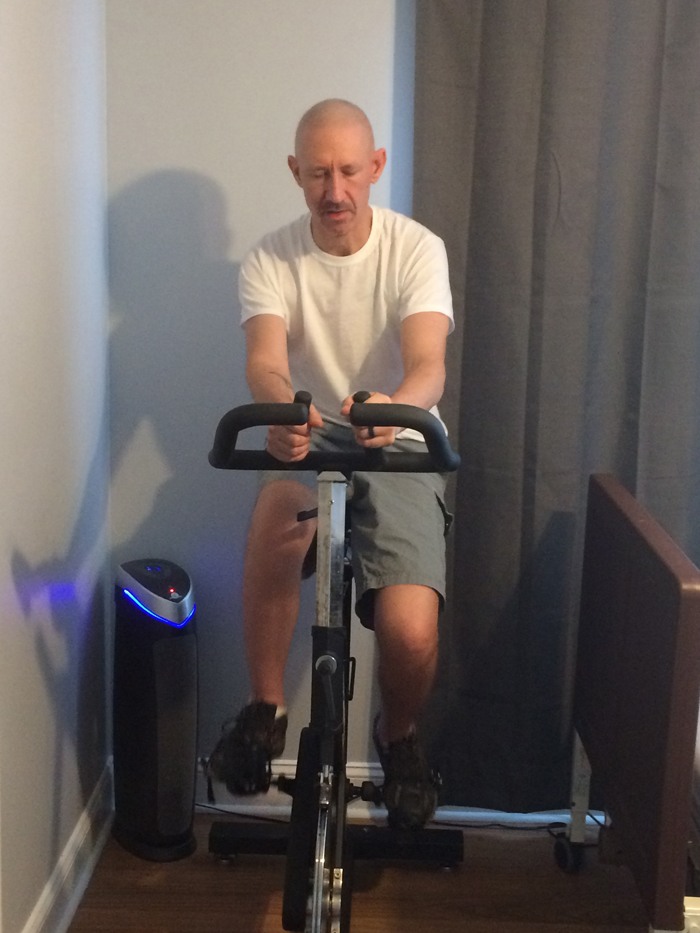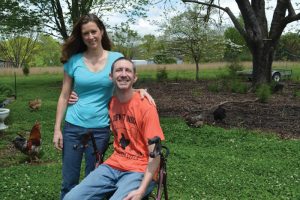Justin Smart improving after MS treatment in India — ‘Worth it for the hope’
Published 12:00 am Sunday, September 9, 2018

- Justin just rode the bike for the first time. His legs were bouncy at first, but it got better. He rode for about 8 minutes and he could've gone longer, but he needs to figure out what he can handle.

Justin and Candice shortly before they left for India so he could receive stem cell treatment for MS. They snuck off to the beach and got married May 4.
“If there’s something you can try, you should. So many people came together to make this happen. There’s no rock we didn’t turn over. We did what we could. We have no regrets.” — Justin Smart, MS patient
By Susan Shinn Turner for the Salisbury Post
ROCKWELL — Justin Smart did two push-ups the other day. He was stoked.
Justin, 38, diagnosed with Primary Progressive Multiple Sclerosis six years ago, recently returned from India, where he underwent a stem cell transplant. The hope is that the procedure — not approved for MS treatment in the United States — would halt the progression of the disease.
So far, he’s doing well.
“I have settled into an exercise routine with exercises my physical therapist gave me in India,” Justin says.
His first round of follow-up bloodwork looked good. Both Jeff Taylor, his physician assistant here with Trinity Medical Care, and his physician in India say he’s doing great.
“His numbers just could not look any better,” Jeff says. “He’s getting stronger each day. Right now, we are seeing that he is not rejecting his transplant.”
Since returning home in late July, he’s pretty much stayed in his “clean room,” a bedroom and bathroom especially prepared at the Rockwell home he shares with his wife, Candice Basinger. (The two of them snuck off to the beach and got married May 4.)
With his immune system completely zapped in preparation for the transplant, Justin has to be especially careful of germs until his immunity returns.
“I still spend about 75 of my day in the clean area,” he says.
“We are guarding him as we would a leukemia patient,” Jeff adds.
There’s a hospital bed, a TV, an exercise mat for floor exercises, hand weights and a chair. Everything that comes in that room is sanitized by Candice. His family also got him a power chair in case his condition does not improve.
For now, he says, “it makes it nice and easy to stand.”
Although some people might not like being confined to two rooms, Justin says that the space works perfectly for him. A host of volunteers — local businesses and individuals alike — converted the two rooms while he and Candice were away. He feels like he’s in a nice hotel room, he says.
Justin says that he’s received obvious benefits from his daily exercise program.
“I feel better,” he says, “and it cuts down on the boredom of being in the clean room.”
He’s made a schedule and sticks to it. He takes Tuesdays and Thursdays off, and works out as strenuously as he can on Wednesdays. The rest of the week, he varies his routine to concentrate on his arms, legs, wrists, shoulders, ankles and core. Each day, he also tries to increase the amount of time he spends standing up. So far, that’s between 15 and 40 minutes.
“Even on days I exercise, if I give myself an ample rest time, I can still stand,” he says.
On Wednesday, he tried out a stationary bike.
“He rode for about eight minutes and he could have gone longer, but he needs to figure out what he can handle,” Candice reports.
Justin is trying to eat as healthfully as possible. Friends and family brought meals while he and Candice settled into a routine. Now, Justin can prepare his own breakfast and lunch, while Candice takes care of cooking supper. He’s gained weight since returning home, from 149 to 161, and hopes to gain about 14 more pounds.
In India, Justin says he received excellent care. “They had a schedule. When you reach this point, you do this thing. I never felt endangered. When I did spike a fever, they knew what to do. They were very proficient.”
In one post on his facebook page Justin to India for Stem Cell Treatment, he talked about the “superheroes” behind the masks.
He wrote: “Sometimes you catch a glimpse of the staff without their masks and hair nets through the window. You get so used to the eyes and voices. Candice and I have had the pleasure of meeting and talking with many of the support staff. During the rough times it was mainly the male staff. I can only assume it was because I wasn’t wearing pants ever, but who knows? As hard as it was and as bad as I felt, I didn’t worry. They always knew what to do, what to administer, how to do their job. I always felt better after they did their thing — whizzing around speaking to each other in one of many languages. Saying ‘support staff’ just doesn’t sound like enough. With their masks and secret languages they were more like superheroes to me.”
He says now, “When you go through something that tough, you form bonds. We feel pretty close to the staff there. They took really good care of us. One thing that really impressed me was that the doctor would come into consult twice a day. We had a chance to speak with the doctor in charge if we had questions. Almost everybody we ran into spoke three languages: English, Hindi and the language of their province.”
Justin lost a few days during treatment because of high fevers.
“They expected it was a possibility,” he says. “They gave me antibiotics and did a blood culture to figure out what was causing the fever. Then they gave me a more targeted antibiotic.”
Justin and Candice could have come home earlier, but decided to stay and make sure he was doing OK. The trip home was a 28-hour ordeal, with Justin wearing a mask the whole time. But every airline was aware of his special needs, and quickly transferred him via wheelchair wherever he needed to go.
“They were on it,” he says. “They all did the best they could. Travel is a finite time, so that’s what I focused on.”
Justin is still staying pretty close to home. He’s still concerned about getting a fever. The hard part, though, definitely is over, he says.
“I had so much support when I was in India,” Justin says. “Even the hard part was easier with all the expertise and reassurance I got.”
Justin says that all the encouragement he continues to receive gives him motivation. After all, members of the community raised more than $50,000 in five months for Justin and Candice to travel to India.
“It’s not only me I’m answering to,” he says. “There are a whole lot of people out there who want to see this work.”
Justin says the success rate of the stem cell procedure is about 60 percent.
“For a disease they don’t know much about and the fact that there is one medication approved, if anything, it was worth it for the hope,” he says. “I’m able to look forward to something again. We’ve met a lot of great people and made a lot of MS connections.”
Justin is eager to return to the MS Support Group, which meets the second Monday of each month at the Hurley Y. (It doesn’t meet during the summer as heat is detrimental to MS patients.)
The Samantha Harkey Foundation, which assisted Justin, is hosting an event at Calvary Baptist Tabernacle on Sept. 8 to benefit Rhonda Lowe, a fellow MS patient, in her care. Her husband, Tommy, is disabled, and can no longer care for her on his own.
At some point, Justin will have an MRI to determine whether any new lesions have formed in his brain and spine, and whether the disease has been halted. Jeff explains that if the disease is halted, Justin would be considered to be in remission.
Justin is not dwelling on it.
“It’s more like a checkmark,” Justin says. “We’ve got to do it, regardless of how it turns out.”
He adds of the entire experience, “If there’s something you can try, you should. So many people came together to make this happen. There’s no rock we didn’t turn over. We did what we could. We have no regrets.”




